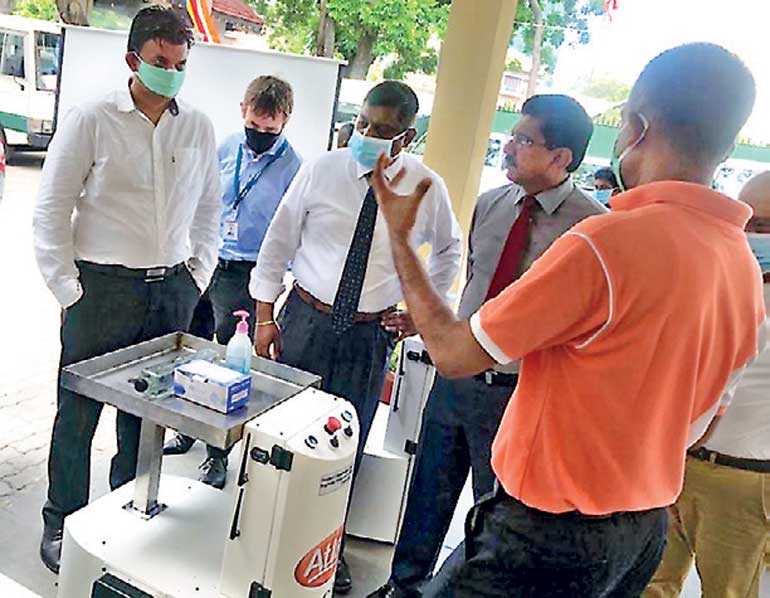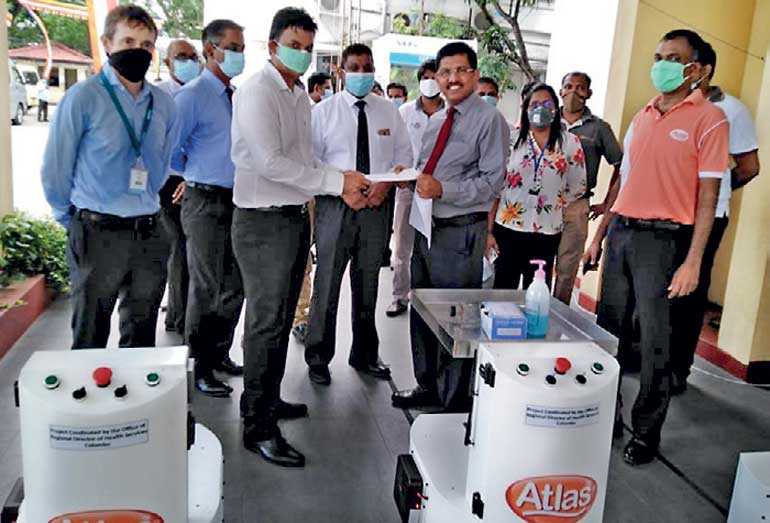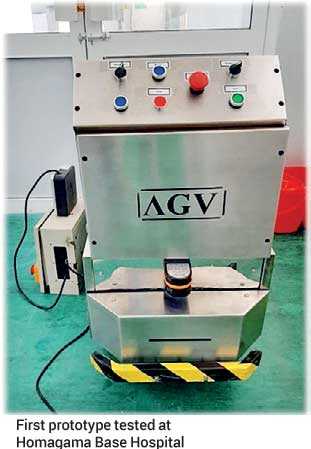Monday Feb 23, 2026
Monday Feb 23, 2026
Tuesday, 2 June 2020 00:04 - - {{hitsCtrl.values.hits}}

Atlas Axillia COO - Director Operations Viraj Jayasuriya explaining the functionalities of the AGV Robots

Atlas AGV being tested at Homagama Base Hospital

The official handover of the three newest AGV Robots to the health officials
By Medha de Alwis
Hemas Holdings’ subsidiary Atlas Axillia, which spearhead the local invention of an Automated Guided Vehicle (AGV) robot to assist in the nation’s fight against the novel coronavirus (COVID-19) pandemic, is to expand its availability to more hospitals in tandem with required investments.
In March Atlas Axilla gifted the robot, costing Rs. 1 million, to the Ministry of Health for use at the Homagama Base Hospital, one of the many treating COVID-19 patients, followed by another in April to the Iranawila Base Hospital. The robot is developed in partnership with several local universities and their students undertaking internship at Atlas Axillia.Atlas Axillia Managing Director Asitha Samaraweera recently told an online press conference that the company had invested Rs. 7 million on this initiative and planned to make the robot available at hospitals in Mulleriyawa and Kurunegala.
Regional Director Health Services Colombo Dr. Indika Jagoda emphasised the importance and benefits of the AGV robot in assuring safety of the healthcare worker as well as the non-COVID-19 infected patient whilst in a hospital.
Iranawila Base Hospital Director Dr. Dimuth Ponweera explained that the six meal/tea serving times were in effect in the COVID-19 unit of his hospital; the three main meals, morning and afternoon tea and a late evening tea at 20.00 hours. A healthcare worker would generally serve the said food items at the risk of being infected with COVID-19. Yet, thanks to the AGV robot, personally serving food is now unnecessary, which minimises the risk the healthcare worker faces to a great extent.
The other uses of the robot include measuring temperature of the patient and communication between the patient and the healthcare worker as key aspects.
There is no necessity for the doctor to get close to the patient because of the robot. The patient can speak to the screen of the robot and this information can be channelled to the control room. The ability for a doctor to converse with the patient is available via the robot, and due to the visual capability of the screen, the doctor can not only communicate, but also ascertain the gestures of the patients, making salient observations such as getting an idea about the breathing rate and the general condition of the patient, without physically visiting the patient at close quarters. This is a great advancement in protecting the healthcare worker, who is otherwise greatly vulnerable to exposure to COVID-19.
Addressing a concern as to how familiar a non-tech-savvy patient would be with the robot, the Atlas Axillia team explained that the healthcare worker was trained to work with the robot and the medical team explained that the patients too would not have a problem as there was a healthcare worker always physically available at the ward in case of any need.
Atlas Axillia Chief Operations Officer Viraj Jayasooriya also said there was zero maintenance cost for five years, expect when it came to the battery which is auto-charged with wireless charging, which would need to be replaced in two years at the cost of Rs. 25,000. The robot does not have the capability from going from one floor to another, but can serve unlimited patients on the same floor.
Jayasooriya also said Atlas Axillia was ready to manufacture more robots of the kind, provided a State or a private hospital was ready to invest in the project.
As part of its overall support to the country’s fight against the spread of COVID-19, Atlas Axilla donated 50,000 masks worth Rs. 2 million to the Sri Lanka Army by diverting the resources that were available to manufacture bags in the normal course of business in the company.